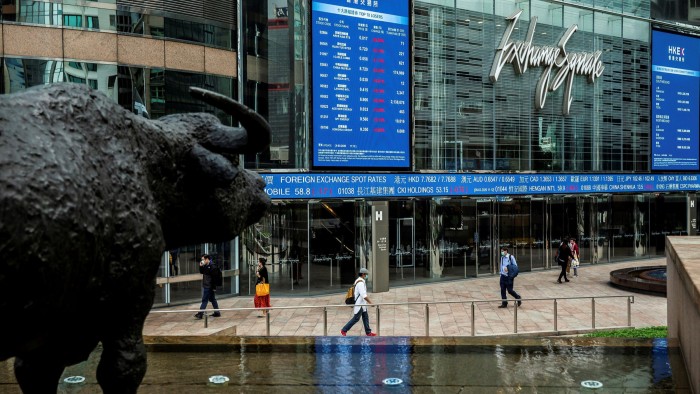Asia high-yield ETF inflows surge even as performance plummets

Simply sign up to the Exchange traded funds myFT Digest -- delivered directly to your inbox.
Interested in ETFs?
Visit our ETF Hub for investor news and education, market updates and analysis and easy-to-use tools to help you select the right ETFs.
Asia high-yield exchange traded funds have been attracting substantial inflows despite a huge drop in returns in the second half of the year.
The Singapore-listed iShares Barclays USD Asia High-Yield Bond ETF attracted $1.37bn in net inflows in the last three months of 2021 after dominating net inflows into ETFs listed on Singapore’s stock exchange last year.
In Hong Kong, the Premia Partners’ Premia China USD Property Bond ETF, which became the territory’s first high-yield bond ETF when it was listed in April last year, attracted $10.22m in net inflows during the fourth quarter in 2021, data from Morningstar show.
Elsewhere, Haitong International’s London-listed Tabula Haitong Asia ex-Japan High Yield Corporate Bond ESG ETF, which was launched in September last year, saw its assets grow tenfold to $205.9m over the same period.
The inflows have continued to surge even as the performance of these Asia high-yield ETFs has plummeted over the past six months.

This article was previously published by Ignites Asia, a title owned by the FT Group.
The net asset value of the BlackRock Asia high-yield ETF dropped more than 23 per cent between May 2021 and mid-January 2022, while the Premia Partners property bond ETF has dropped more than 40 per cent since its inception.
The Asia high-yield bond market has been dominated by US dollar-denominated debt issued by Chinese property giants that are also facing tightening curbs on borrowing and declining home sales.
It was first sparked by Evergrande Group, the world’s most indebted property developer, which missed an interest payment on an offshore bond on September 23 and was deemed by Fitch to be in default in December. China’s debt-laden property sector has reported multiple similar warnings on overdue bond payments from various Chinese real estate developers over the past few months.
But this turmoil has not deterred many global investors from piling into Asia’s high-yield bond market, with ETFs providing a convenient and liquid access point, a trend that has continued this year.
“Despite the recent volatile conditions in the China property sector, we have continued to see substantial levels of net creations in our Singapore-listed Asia high-yield ETF since the beginning of the year,” BlackRock said, adding that interest had been noted from institutions in the Asia-Pacific, Europe, the Middle East and Africa.
Frederick Chu, Hong Kong-based head of ETF business at Haitong International, said its Asia high-yield ETF had attracted interest from various European investors who saw the current crisis as an opportunity to “enter at a relatively cheap level to capture the upside”.
Both tactical traders and long-term allocators, including asset managers, pensions and private banks, had been buying into the product in recent months, he said.
The opportunity to diversify away from single bonds had added to the interest in the ETFs, observers said.
Rebecca Chua, managing partner and founder of Premia Partners, said investors had “suffered significant losses in their single bond positions” during the China property sector’s debt crisis.
While some investors were looking to bottom fish from the crisis, most investors were looking for a long-term investment solution, according to Chua.
All three ETFs have exposure to bonds issued by developers that have been downgraded by international rating agencies, or whose credit has been downgraded.
For example, the iShare ETF holds three Evergrande bonds with maturities between 2024 and 2025 that are currently rated C by Moody’s, the lowest level with little prospect for recovery of principal or interest. Fitch Ratings downgraded Evergrande, and subsidiaries Hengda and Tianji to “restricted default” in December.
Premia’s ETF has a 2.24 per cent weighting to a Sunac bond that matures in 2024. Sunac China Holding was downgraded to BB- with a “negative” outlook for the group by Fitch Ratings on January 19.
Meanwhile, the Haitong ETF holds two bonds, maturing in 2023 and 2026, issued by Logan. The 2023 holding sank to about 65 cents in January from about 98 cents at the end of December, Bloomberg data show.
While none of those real estate giants have declared bankruptcy, as some have managed to delay payment or secure new loans just before the due dates, increasingly foreign bondholders are becoming frustrated at receiving very different treatment compared with onshore investors.
A group of investors holding more than $1 billion worth of bonds issued by Evergrande on January 20 protested against what they described as an “opaque” and exclusionary debt restructuring process led by the group and the local government. The investors have warned of legal action due to a lack of “substantive engagement” from the company. Evergrande, which is restructuring, is prioritising the domestic homeowners.
*Ignites Asia is a news service published by FT Specialist for professionals working in the asset management industry. It covers everything from new product launches to regulations and industry trends. Trials and subscriptions are available at ignitesasia.com.

Click here to visit the ETF Hub

Comments